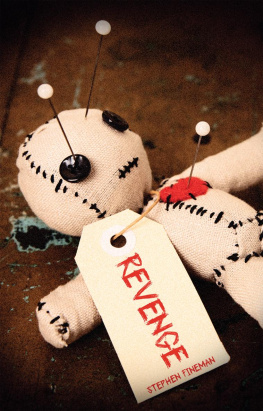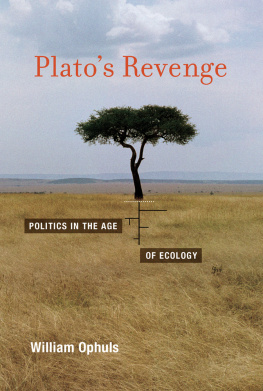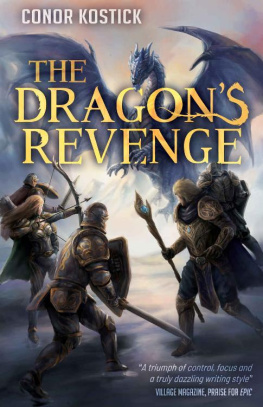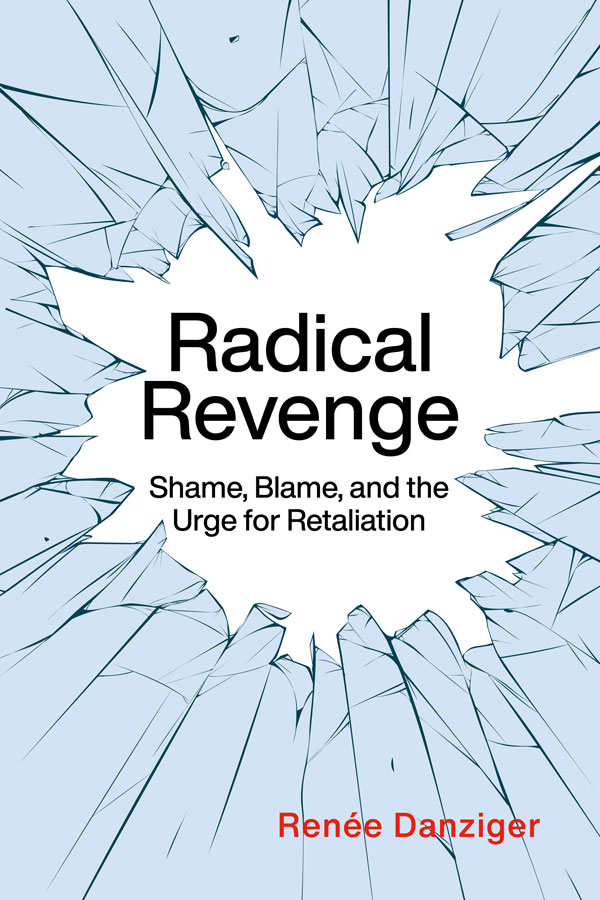Radical Revenge
Shame, Blame and the Urge for Retaliation
Rene Danziger
a Free Association Books publication
First published by Free Association Books.
Copyright 2021 Rene Danziger
The authors rights are fully asserted. The rights of
Rene Danziger to be identified as the author of this work has been asserted by her in accordance with the
Copyright, Designs and Patents Act 1988
A CIP Catalogue of this book is available from
the British Library
isbn: 78-1-911-38347-5
All rights reserved; no part of this publication may be reproduced,
stored in a retrieval system, or transmitted, in any form or by
any means, electronic, mechanical, photocopying, recording or
otherwise, without the prior written permission of the publisher.
Nor be circulated in any form of binding or cover other than that
in which it is published and a similar condition including this
condition being imposed on the subsequent purchaser.
Typeset by
Typoglyphix
www.typoglyphix.co.uk
Cover design by Chandler Book Design
This book is dedicated
to the memory of my parents,
Regina Liebermann Danziger
and
Leo Danziger
Acknowledgements
Id like to thank all the many friends and colleagues who generously shared their thoughts about revenge with me over the past couple of years. I owe a special thanks to my sisters, Diana Danziger and Gloria Danziger, for their unfailing support and their very helpful comments on an earlier draft. Heartfelt thanks also to Emma Whitlock for her valuable feedback, which I appreciated enormously. Im indebted to Kaye Wellings not only for commenting so helpfully on the draft but also for all the moral support she gave me along the way. Warm thanks to Jonathan Sklar for his invaluable insights, and to Ruth McCall for her thoughts on Chapter One. Stephen Frosh read a very preliminary outline and Im grateful that he encouraged me to keep going. Peter Langman, who has conducted extensive research into school shootings in the US, gave me very good advice on gaining access to primary source materials. Im particularly grateful to him for the excellent resources which he has made available on his website. Doing research on internet revenge proved to be more challenging than Id expected, and Id like to thank Kate Samuelson for the very useful pointers she gave me. I have so much to thank Jodie and Jon for, including their cheerful enthusiasm and continuing interest in my work on revenge. Im also grateful to the many people I met at the Trump re-election rally in New Hampshire for talking so openly with me about their experiences and beliefs. A big thank you to Alice Solomons at Free Association Books, and to Lisa Findley for her very fine editing. Above all, my thanks to Neil Mitchell for supporting and spurring me on, commenting thoughtfully on each chapter, and restoring my confidence whenever it began to flag. For that, and for much more, Im so very grateful.
Illustrations in this book are reproduced by kind permission as follows:
Peter Steiner On the Internet, nobody knows youre a dog : The New Yorker Cartoon Bank
Artemisia Gentileschi Judith Beheading Holofernes : Gallerie degli Uffizi, Florence, Italy 2020
Artemisia Gentileschi Jael and Sisera : Szpmvszeti Mzeum, Museum of Fine Arts, Budapest, Hungary 2020
Artemisia Gentileschi Self-Portrait as Saint Catherine of Alexandria : National Gallery, London, UK 2020
Introduction
Pondering the punishment of French collaborators in 1946, Simone de Beauvoir hit upon a fundamental truth. Vengeance is not justified by realistic considerations, she wrote. To the contrary: if all we cared about was effectiveness, wed renounce the urge to punish (de Beauvoir 1946). She had a point. Revenge does nothing to undo the harms that have been done and it rarely brings more than a fleeting sense of satisfaction. Worse still, revenge often provokes counter-revenge, leading to a destructive cycle that can result in full-scale conflict. And yet, despite all this, most of us find it impossible to resist the urge for revenge. What makes this urge so compelling? And why can some people only satisfy it with extreme and destructive acts? These questions have a particular urgency at a time when social media offer new and brutal forms of revenge, and the rise of populism has brought angry calls for retribution against minorities and other perceived enemies. This book sets out a new way of thinking about our proclivity for revenge, and through the concept of radical revenge it gives some meaning to what may otherwise appear to be senseless acts of wanton destruction.
Revenge as a fact of life
Put simply, revenge consists of A retaliating against B in response to (the belief that) B has harmed A. Revenge is a form of aggression, but the two are not synonymous. Aggression can be mobilised for all sorts of reasons, including defence against a threatened or actual attack, whereas revenge is specifically about payback and is accompanied by a distinctive feeling of righteous redress.
Its no exaggeration to suggest that revenge has shaped human history. Over the centuries it has fuelled assassinations, executions, persecution, protests and bloody battles, from King Menelauss revenge on the Trojans after Paris ran off with Helen; to the brutal punishment of alleged heretics during the Spanish Inquisition; to the attacks on individuals associated with the ancien rgime during the French Revolution; the assassination of Archduke Franz Ferdinand in Sarajevo in 1914 and its bloody aftermath; the genocide in Rwanda in the early 1990s; and the ethnic cleansing in parts of the former Yugoslavia. In these, and in so many other conflicts around the world, the desire for revenge has played its part.
Revenge punctuates everyday life too, so much so that we may not even recognise it as revenge. Toddlers will happily play together until one of them snatches the others toy; the aggrieved child responds by knocking down the first childs tower of bricks. School pupils enjoy spending time together until one hears that the other has achieved a better exam result, at which point they start to spread rumours that their rival is a boring swot. When someone cuts into a long queue of people waiting for the bus, the person behind them might make a point of pushing into them as they step onto the bus. A customer who complains that his food is cold might receive a warmer dish which has the waiters saliva secretly stirred in to it. When a spouse is found to have been unfaithful, they may find their favourite jacket torn to shreds. Examples abound.
Despite our familiarity with revenge, it remains a constant source of fascination and a recurring theme in some of the worlds greatest literature, from Euripidess Medea and Sophocless Electra , to Shakespeares King Lear and Hamlet , to Emily Bronts Wuthering Heights , Nathaniel Hawthornes Scarlet Letter , and Arthur Millers The Crucible . Those who prefer watching rather than reading about revenge are spoiled for choice. They can switch on the US television series Revenge or the British mini-series Retribution ; or they might prefer The Sopranos , Billions , Succession or Damages , each of which features plots and sub-plots laced with revenge. Cinema also explores revenge from a variety of angles, from Westerns about a lone cowboy seeking revenge on bandits, sheriffs, outlaws or Native Americans; to horror films such as Brian De Palmas Carrie ; to violent dramas including Death Wish , Kill Bill , and of course Francis Ford Coppolas classic film, The Godfather . Who can forget the scene in which Jack Woltz wakes up to find the severed head of his prized race horse lying next to him in his bed? Distraught and dripping with the horses blood, Woltz is forced to acknowledge that the Godfather will stop at nothing to punish those who defy him.












